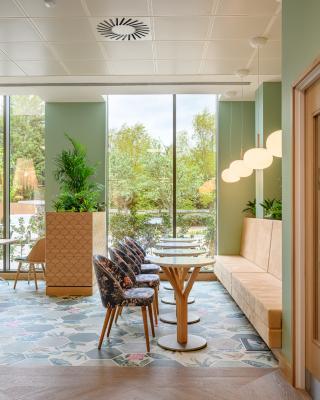In the past 20 months, the concepts of ‘work’ and the ‘workplace’ have undoubtedly changed in the most significant way in a generation. Densely populated with knowledge workers, our region is famously built on ideas and innovation, attracting amazing people and companies to our community. We’re home to the Cambridge Phenomenon. So, what does it mean when our concepts of ‘work’ and ‘workplace’ have become geographically unanchored?
Over the summer/autumn 2021, we conducted research to model the many different experiences that people have had locally since the pandemic and reveal implications for us all moving forward. Cambridge Network kindly hosted a webinar for its members last month to share and discuss the findings from this research. We had over 1,000 responses to our survey which has helped us explore how expectations have varied between people.
Our research illustrated there is no ‘one size fits all’ approach.
We explored five threads emerging from our research which have implications for managers and employers:
CONNECTION - How can we help people to reconnect? People managers may want to consider exploring the needs of people at different management grades and life stages. When considering workplace design, you may want to think about space where people can socially connect.
CONSISTENT EXPERIENCE - How can we create a consistent employee experience? People managers may want to evaluate the work their team must, should or could do in the workplace and what can be done anywhere. You may also want to think about bringing more home comforts into the workplace to make it feel more attractive.
VISIBILITY - How do we manage performance? Before the pandemic, the onus was often on part time or remote workers rather than the employer to make extra efforts to be visible, to feel informed, to network. This has flipped and workers expect employers to help increase their visibility. People want to be seen if they have made the effort to commute.
MANAGING EXPECTATIONS - How do we manage worker expectations fairly? Fairness of people’s informal arrangements is likely a headache for many people managers. It is worth noticing the peer pressure to conform to certain behaviours that we might not be individually comfortable with.
CULTURE - How do we shape our culture and brand as an employer? As our lives outside of work become more visible to colleagues, it encourages us to be more personable, authentic, vulnerable and fallibly human. Investment in creating amazing and enriching workspace will be considered a trademark of the company and a benefit for those who work there.
If you would like help with designing and implementing any of these areas of recommendation or to explore how to make hybrid working successful in your organisation, please contact me at kelly@talentglue.com or Lizzie Bradbury at COEL via lizzie@coel.uk.com.
Watch a recording of the Cambridge Network webinar
Image courtesy of COEL
